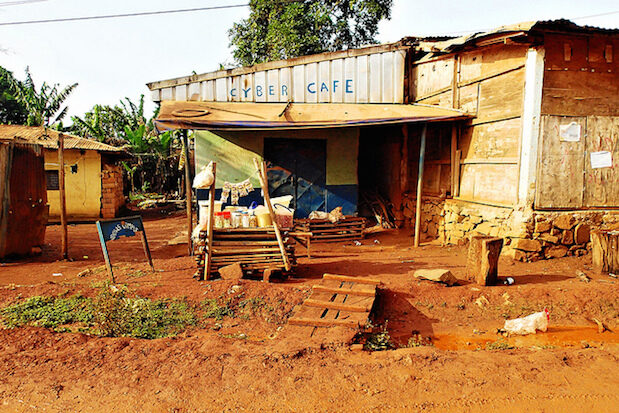
The last decade has seen a rapid growth of Internet access across Africa, although it has not been evenly distributed. Cameroonian Cybercafe by SarahTz (Flickr CC BY 2.0).
There is a consensus among researchers that ICT is an engine for growth, and it’s also considered by the OECD to be a part of fundamental infrastructure, like electricity and roads. The last decade has seen a rapid growth of Internet access across Africa, although it has not been evenly distributed. Some African countries have an Internet penetration of over 50 percent (such as the Seychelles and South Africa) whereas some resemble digital deserts, not even reaching two percent. Even more surprisingly, countries that are seemingly comparable in terms of economic development often show considerable differences in terms of Internet access (e.g., Kenya and Ghana). Being excluded from the Internet economy has negative economic and social implications; it is therefore important for policymakers to ask how policy can bridge this inequality. But does policy actually have an effect on these differences? And if so, which specific policy variables? In their Policy & Internet article “Crossing the Digital Desert in Sub-Saharan Africa: Does Policy Matter?”, Robert Wentrup, Xiangxuan Xu, H. Richard Nakamura, and Patrik Ström address the dearth of research assessing the interplay between policy and Internet penetration by identifying Internet penetration-related policy variables and institutional constructs in Sub-Saharan Africa. It is a first attempt to investigate whether Internet policy variables have any effect on Internet penetration in Sub-Saharan Africa, and to shed light on them. Based on a literature review and the available data, they examine four variables: (i) free flow of information (e.g. level of censorship); (ii) market concentration (i.e. whether or not internet provision is monopolistic); (iii) the activity level of the Universal Service Fund (a public policy promoted by some governments and international telecom organizations to address digital inclusion); and (iv) total tax on computer equipment, including import tariffs on personal computers. The results show that only the activity level of the USF and low total tax on computer equipment are significantly positively related to Internet penetration…
